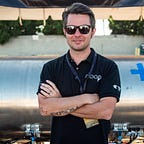rLoop — A Less Brief Introduction
In June of 2015, SpaceX announced an open competition for independent and student engineering teams to design a Hyperloop pod, at approximately half scale, for the opportunity to be tested on a 1-mile track built at their headquarters in Hawthorne, California. Within hours of the competition announcement, a post on the SpaceX subreddit suggested the community, which is known for its engineering-oriented members and high-quality discussions, collectively form a team. The belief was that strangers from the internet could come together, united by a common goal, and compete against top engineering companies and universities around the world.
Out of that initial conversation, rLoop was formed. The group organically organized to form a hierarchy-free team that operates in the cloud, facilitating collaboration with modern online tools. It was an experiment in open collaboration fueled by passion alone. And it started to gain a lot of traction.
Meeting daily online, rLoop continued to grow with members from more than 16 countries working around the clock to put together a design package for SpaceX. Members desiring to be part of a world-changing technology brought a diversity of talents and resources to rLoop. Visions and concepts for subsystems flowed openly, and rapid iteration accelerated progress unhindered by traditional organizational barriers.
The design approach for rLoop was always to test and demonstrate technology that would reflect a solution for the full scale Hyperloop system, although this was not explicitly required for the competition.
From the initial 1,200+ submissions, rLoop was selected as one of 124 teams invited to the Design Weekend Competition at Texas A&M University to present their design to SpaceX and Tesla engineers. On January 28th, 2016, nine members of the more than 250 on the rLoop team travelled to Texas and met in person for the first time. After two days of presenting their design package and answering questions from judges, other teams, the public, and from the press, the results were announced.
rLoop was selected along with 22 other teams to advance to the final stage of the competition: manufacturing and competing their Hyperloop Pod on the SpaceX test track. rLoop was awarded the “Best Non-Student Design”.
With our designs approved by SpaceX, the focus shifted to translating the virtual designs to a tangible prototype. This presented a new challenge for the team, but one for which we were prepared. Drawing on our experiences while organizing the distributed virtual team, we leveraged the strengths of a remote workforce and established a framework in which global members could contribute to the manufacturing process. This approach allowed us to physically manifest in proximity to the final destination of the prototype, minimized the need for a large physical footprint, and leveraged member access to specialized equipment.
In October of 2016 a smaller team of rLoopers participated in a 48 hour design competition organized by BuildEarthLive that focused on a Hyperloop Ecosystem for the UAE. Of the 65 teams from 29 countries who participated in the competition, rLoop was shortlisted along with 5 others to present their concept to the Dubai Future Foundation. Two members were flown to Dubai to work for 5 days and present to the CEO Mr. Saif Al Aleeli. rLoop was awarded the “Best Hyperloop Design, Drama, Excitement: Best Architectural Design and Presentation”.
Initial testing of the rLoop Hyperloop prototype took place on November 17, 2016, at SpaceX’s track. Based on results from that experience, we returned to our manufacturing space to finalize integration in the two months remaining before the competition.
Throughout this experience, we realized the power of the process we had pioneered. Over the 19 months leading up to the SpaceX competition, rLoop has had over 1,000 contributors from more than 16 countries, over 950,000 hours logged in design and manufacturing, over 675,000 messages exchanged on our communication platform, self-funded the manufacturing of our prototype between a successful crowdfunding campaign and key sponsorship's, and secured thousands of dollars worth of manufacturing support and in-kind product donations from strategic partnerships. rLoop now has a dedicated manufacturing site and team in Menlo Park, CA.
The problem with the nature of work to date is the centralization of opportunities and the global distribution of talent. rLoop has shown that there is a vast untapped workforce of talented and diverse people who are eager to participate in developing innovative technology that can have global impact.
In January of 2017, over 60 rLoop members descended on Hawthorne, CA. Many of us had worked together for nearly 2 years and never met in person. Many of us had worked on the hardware for nearly 2 years and never physically touched it. The team worked passionately around the clock (literally) for a week ironing out hardware and integration issues. Despite long hours and a closing window of opportunity, the focus and the morale was incredible. One of the team members described it best, after the fact: “Now with a few days of perspective, I would say … what happened is simply magic.”
After a grueling time testing and presenting to the SpaceX judges, we were able to demonstrate what we had built. Steve Davis, Director of Advanced Projects at SpaceX, brought Elon Musk and his entourage to view our prototype and introduced us as “the team from Reddit”.
Steve Davis: “They didn’t meet until they converged here.”
Elon Musk: “Really? … How did you build it?”
After 19 intense months, with no existing organization or infrastructure supporting us, this team of underdogs who worked tirelessly to have an impact on the world earned the “Innovation Award” from SpaceX, 1 of 5 total awards presented in the world’s first Hyperloop Pod Competition.
When the untapped talent of millions of people has a place to go, the results are incredible.
#servetheloop
